It seems like we were just seeing Wi-Fi 6 and Wi-Fi 6E get settled in, but Wi-Fi 7 is already here. What is Wi-Fi 7? It’s the new IEEE 802.11be standard, succeeding the 802.11ax standard used for Wi-Fi 6. The Wi-Fi Alliance has already begun certifying devices for Wi-Fi 7, and there are indeed some great Wi-Fi 7 routers already on the market.
Wi-Fi 7 is expected to boost theoretical throughput to 46Gbps, easily toppling Wi-Fi 6’s theoretical max of 9.6Gbps. It also offers an expansion to 320MHz channels within the 6GHz spectrum, improved latency ideal for demanding uses like AR and VR, increased MIMO streams, and multi-link operation support that lets your devices use more than one frequency at a time to communicate with the router. To put it simply, Wi-Fi 7 is more reliable while also boosting speeds.
Wi-Fi 7 is still in its infancy, and routers with the new tech don’t come cheap. The good news is that Wi-Fi 7 is backwards compatible with most older standards, allowing you to make a big router upgrade without harming device compatibility. You won’t get access to all the fancy new Wi-Fi 7 features without devices also supporting Wi-Fi 7, but at the least you’ll be setting yourself up well for the future. If you’re ready to make the upgrade, we’ve collected the best Wi-Fi 7 routers you can buy today.
Our favorite Wi-Fi 7 routers in 2024
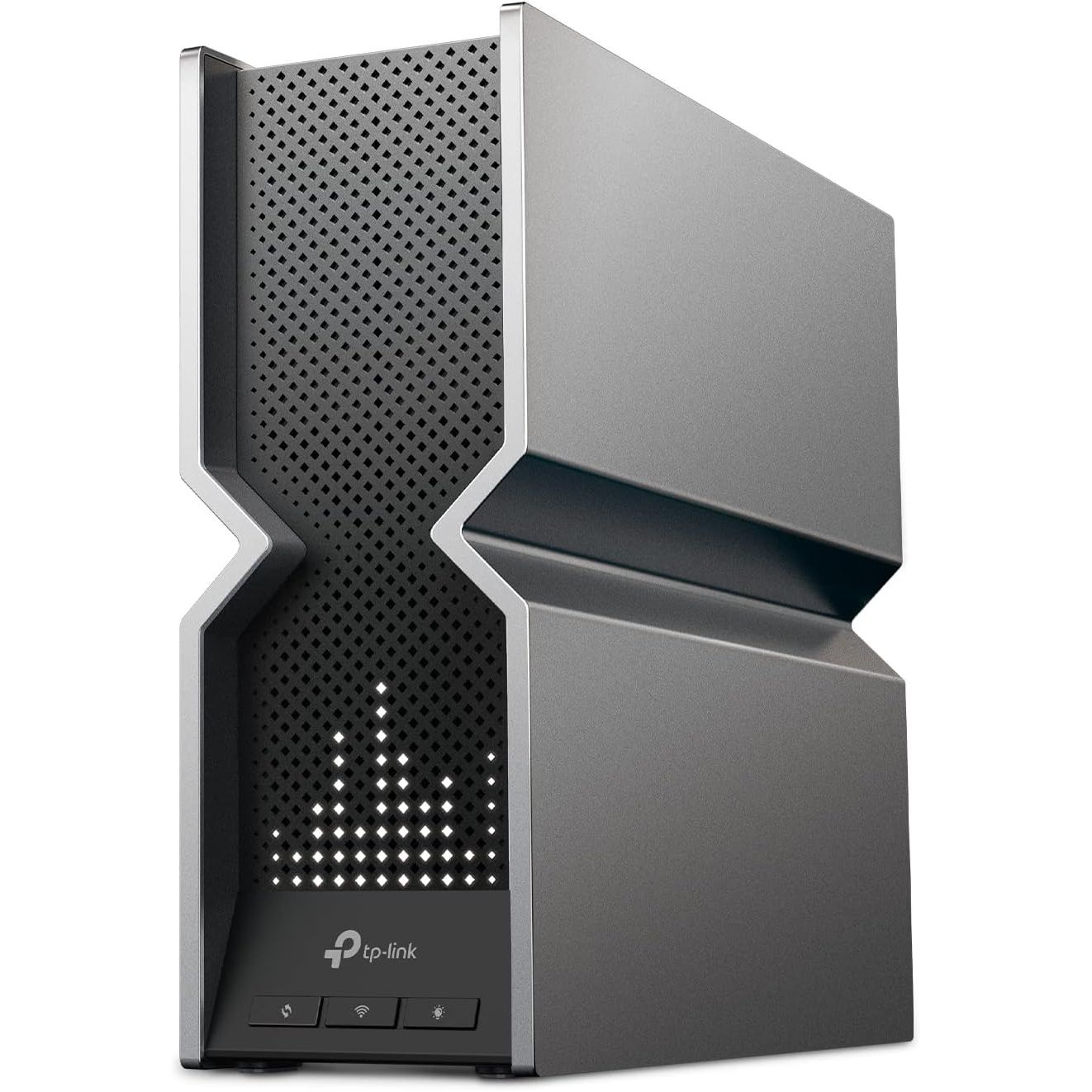
TP-Link Archer BE800
Best overall
Great for most people
$500 $600 Save $100
TP-Link’s Archer BE800 is a great choice for the average user looking to upgrade to Wi-Fi 7. There are tons of settings you can play around with, and it provides solid performance and range. You can also check out the Archer BE550 if you’d like to spend even less.
- Decent port selection with 10Gbps WAN/LAN ability
- Solid range and performance
- Compatible with EasyMesh
- Relatively expensive
- Gamers and power users might want an upgrade
TP-Link has a two-pronged approach to its consumer Wi-Fi 7 routers, with the Archer BE800 and Archer BE550 models. The former is going to suit a lot of people’s needs without going way over budget. Theoretical throughput hits 1,376Mbps on the 2.4GHz frequency, 5,760Mbps on 5GHz, and 11,520Mbps on 6GHz, and there are eight built-in antennas with beamforming capabilities to deliver a strong and reliable signal to your devices.
The back of the router has four 2.5Gbps LAN ports, two 10Gbps WAN/LAN ports (one with SFP+ Fiber combo support), and a USB-A port for connecting other devices like removable storage. The new V-Fold design is a fresh look for TP-Link, and there’s even an embedded LED screen on the front that can display things like weather and time. It also supports TP-Link’s EasyMesh tech for those who need better coverage. At about $500 it’s one of the more affordable Wi-Fi 7 routers on the market, and it should suit most users who don’t have specific high-end demands.
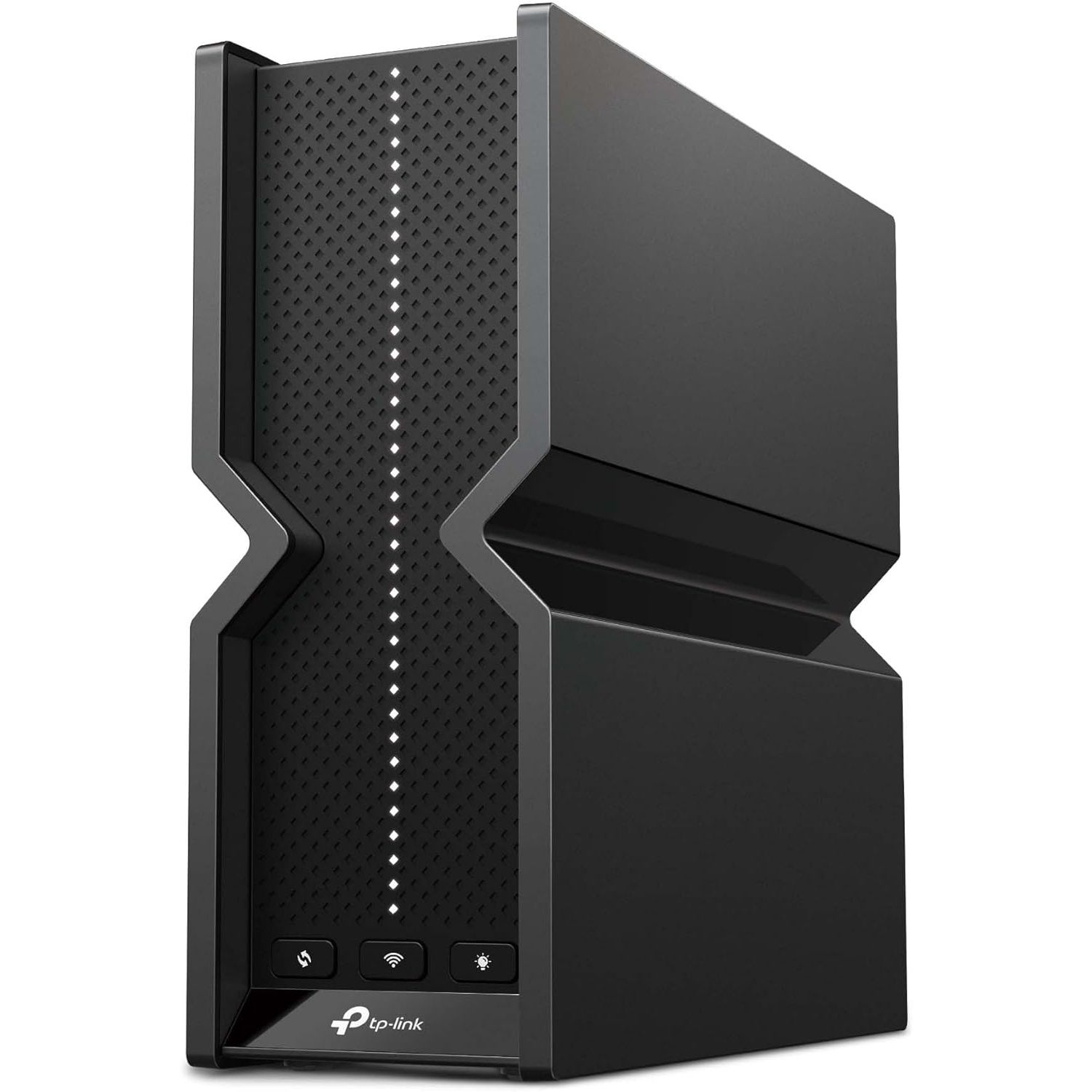
TP-Link Archer BE550
Best value
Affordable Wi-Fi 7 router
TP-Link’s Archer BE550 is a more affordable alternative to the BE800. It lacks some of the high-end features (like 10Gbps wired connectivity and as much range and throughput), but it should be a more affordable way for people to get started with Wi-Fi 7.
- Price is right for those who don’t want to dive in head-first
- Multi-gig LAN/WAN support
- More compact than the BE800
- No 10Gbps LAN/WAN ports
- Still fairly expensive
The TP-Link Archer BE550 is the more affordable sibling to the BE800, coming in at “just” $300. Its theoretical throughput isn’t nearly as impressive, but it’ll still easily handle the average user’s traffic with 574Mbps on the 2.4GHz frequency, 2,880Mbps on 5GHz, and 5,760Mbps on 6GHz. It relies on six internal antennas with beamforming instead of eight, which means it might not be as suited to large, crowded homes or offices.
The Archer BE550 follows the same new V-Fold design as the BE800, but it’s more compact. It’s compatible with EasyMesh for broader coverage, and it has plenty of useful settings if you’d like to customize your network. The back of the router includes five 2.5Gbps LAN ports and a USB-A 3.0 port. You’re out of luck if you’re looking for 10Gbps wired connectivity. While it’s overall not as impressive as the Archer BE800, it’s a great way to dip your toes into Wi-Fi 7 water without breaking the bank.
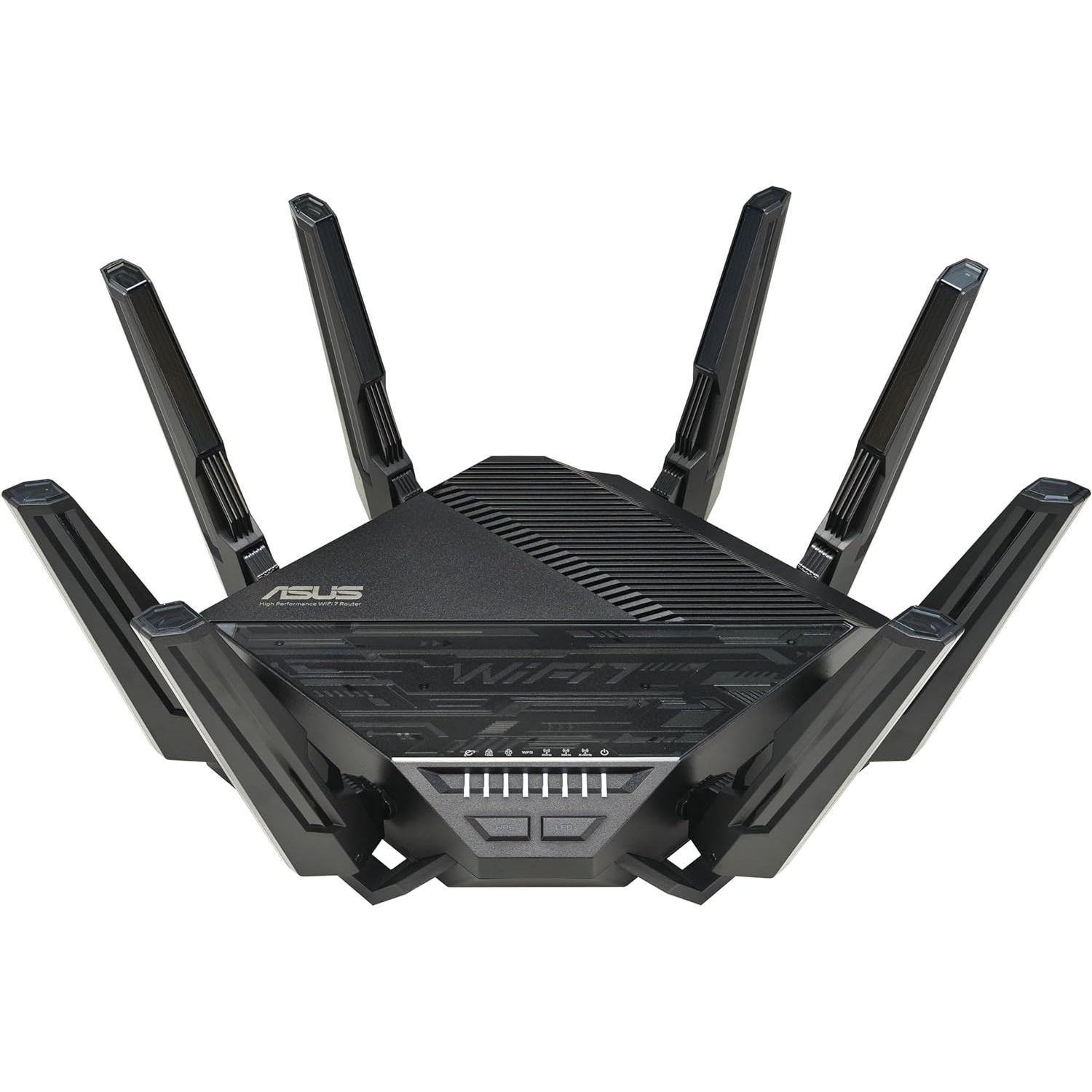
Asus RT-BE96U
Premium pick
Wi-Fi 7 router loaded with features
$685 $700 Save $15
The Asus RT-BE96U costs more than our top pick, but its port selection, performance, range, and added features will certainly appeal to power users and gamers who want a more robust Wi-Fi 7 router.
- Strong throughout and good range
- Lots of ports
- Plenty of extra features, like AiMesh and Game Boost
- Rather large footprint
- Quite expensive
Asus seems to love going with aggressive designs for its high-end routers, and the RT-BE96U is no different. It has eight external antennas that leave plenty of room inside for quiet cooling, and the back of the router is home to a respectable collection of ports. It has USB-A 2.0 and 3.0, dual 10Gbps ports (one with WAN/LAN support), and four standard RJ45 1Gbps ports (with one supporting WAN/LAN).
Theoretical throughout isn’t skimpy, with Asus claiming 1,376Mbps on 2.4GHz, 5,764Mbps on 5GHz, and 11,529Mbps on 6GHz. It’s packed with a ton of extra features, allowing it to, among other things, better handle gaming, parental controls, and VPNs. AiProtection Pro is also included, giving you a real-time safety net against bad actors. To top it all off, the router support Asus’ AiMesh, affording the ability to use the router as the centerpiece for a larger mesh network.
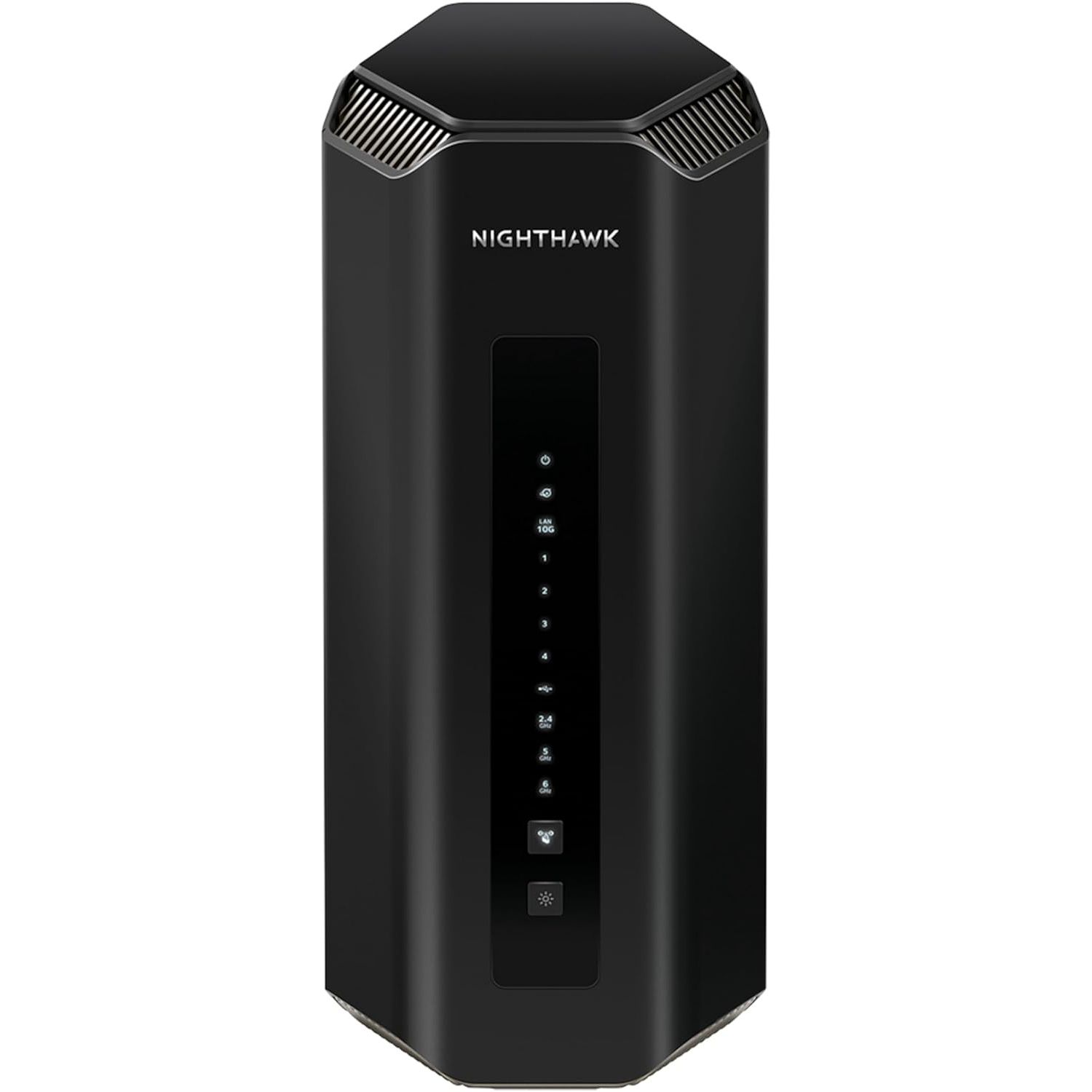
Netgear Nighthawk RS700S
Compact design
Take up less space in your home or office
$650 $700 Save $50
Netgear’s Nighthawk RS700S is the right choice for anyone looking to save space in their home or office. It has a sleek upright design, offering a decent selection of ports, strong throughput, and wide range.
- Slim upright design with no fan needed
- Strong performance and range
- Decent port selection
- Some advanced features cost extra
- Expensive
Netgear’s Nighthawk RS700S is a relatively compact option for those with less space to give to their Wi-Fi 7 router. It’s fanless but manages to keep its cool under load, and it boasts strong theoretical throughout across bands. At 2.4Ghz it hits about 1,400Mbps, 5GHz hits about 5,800Mbps, and 6GHz hits about 11,500Mbps. The slim chassis nevertheless has eight antennas inside, with coverage for up to 3,500 square feet (as claimed by Netgear).
The back of the upright router has a single 10Gbps LAN port, one 10Gbps WAN port, four 1Gbps LAN ports, and a USB-A 3.0 port for connecting removable storage and other devices. Some of the more advanced features, like Netgear Armor and Smart Parental Controls do require paying extra for a subscription, but they’re certainly not mandatory add-ons for all users.
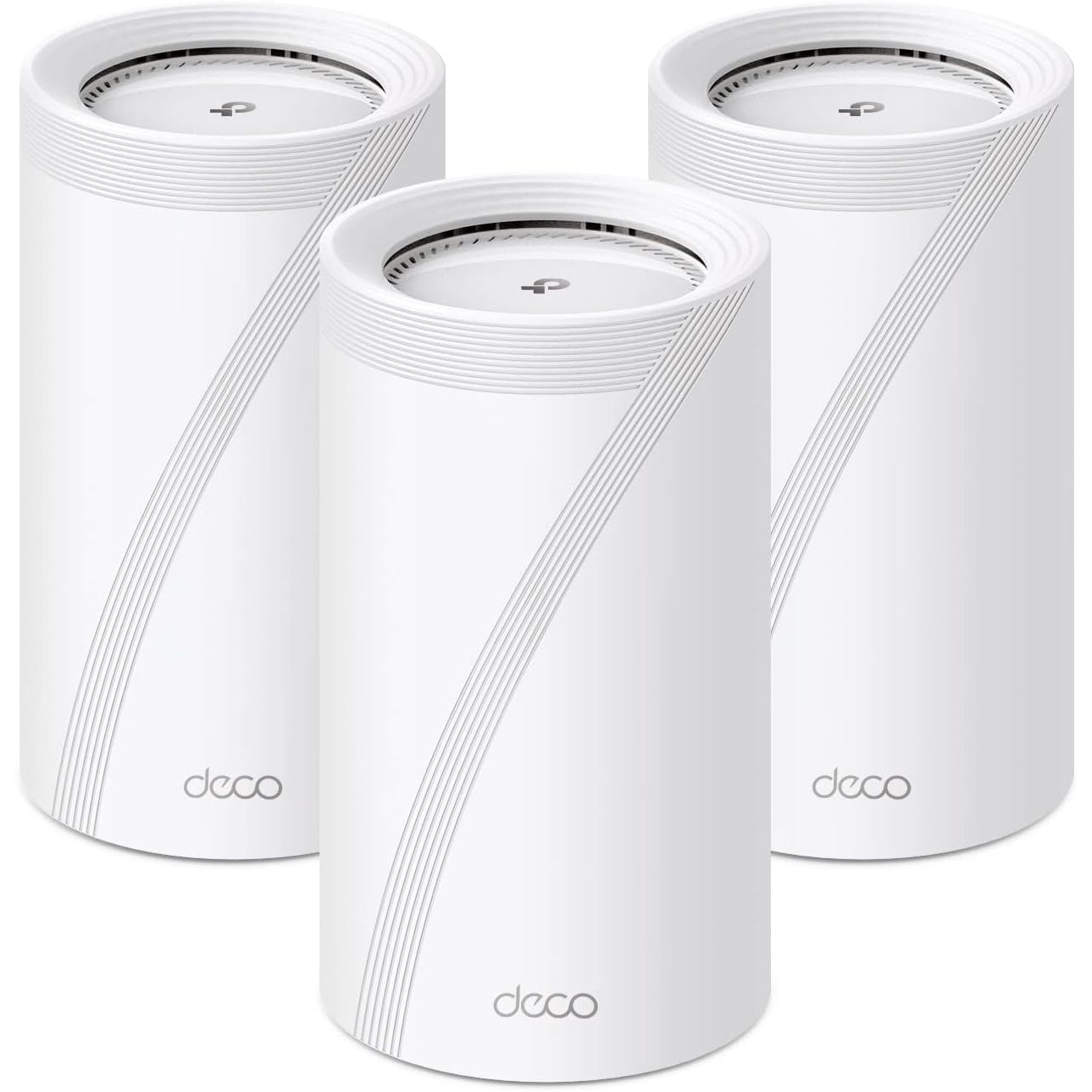
TP-Link Deco BE85
Best mesh
Two- or three-unit packages available
Want to get started with Wi-Fi 7 mesh networking right from the start? TP-Link’s Deco BE85 was the first mesh option available, and it continues to be a top option for anyone who needs wide coverage and strong performance.
- Wide coverage thanks to mesh technology
- Lots of ports, supports wired backhaul
- Excellent performance
- Very expensive
- Overkill for smaller homes and offices
TP-Link’s Deco BE85 is technically a mesh Wi-Fi 7 router, but we’re including it here as an option for anyone who needs a wide-ranging setup right from the start. TP-Link beat its competitors to the Wi-Fi 7 mesh market, and the Deco BE85 has so far proven to be a reliable and powerful option even as other mesh options have now entered the conversation.
The Deco BE85 can handle heavy demand thanks to theoretical throughput hitting 1,376Mbps on the 2.4GHz frequency, 8,640Mbps on 5GHz, and 11,520 on 6GHz. Each unit has eight internal antennas, as well as two built-in fans to keep everything cool. Ports include dual 2.5Gbps WAN/LAN, 10Gbps WAN/LAN, and 10Gbps WAN/LAN combined with SFP+ support. It also has a USB-A 3.0 port. Wired backhaul is supported for the best performance possible.
It starts at $1,000 for a two-pack, but you can add a third node if needed for another $500. Setup, like withother Deco products, is easy as long as you don’t mind using the TP-Link app.
Choosing the right Wi-Fi 7 router in 2024
Wi-Fi 7 is still a new technology, and most devices on the market won’t even be able to take advantage of the improved performance. However, that is quickly changing, and those who are regularly buying new devices — like the Samsung Galaxy S24+ or S24 Ultra — can already see what it’s all about. Wi-Fi 7 is compatible with older standards, meaning you can use your Wi-Fi 6 and Wi-Fi 5 devices on one of the routers listed here, albeit at reduced performance.
I’d still strongly suggest you check out a great Wi-Fi 6 router if you’re looking to maximize value, leaving Wi-Fi 7 hardware to mature and get cheaper. But for anyone who wants the latest technology, these Wi-Fi 7 routers are the best you’ll find today. If we’re making one firm suggestion for a router that will suit most people, it has to be the TP-Link Archer BE800.
It sits more toward mid-range pricing at about $500, and it offers the right mix of performance and features for the average user. Port selection is plentiful with multi-gig support, it offers excellent range and throughput, and it can work with TP-Link’s EasyMesh should you want to expand your network. The LED screen on the front can supply additional information (while also looking oh so cool), and the new V-Fold design is a fresh look for TP-Link’s hardware.
If you’d like to spend even less, the sibling Archer BE550 comes in at about $300 and offers many of the same features. Throughput and port selection isn’t as good, but it nevertheless appeal to those who want to give Wi-Fi 7 a shot without spending big.

TP-Link Archer BE800
Best overall
$500 $600 Save $100
TP-Link’s Archer BE800 is the best Wi-Fi 7 router for most people. It’s priced competitively, it offers strong performance and a good selection of ports, and the long list extra features are easy to configure. It can even work with TP-Link EasyMesh if you want to expand your network.
Source link


